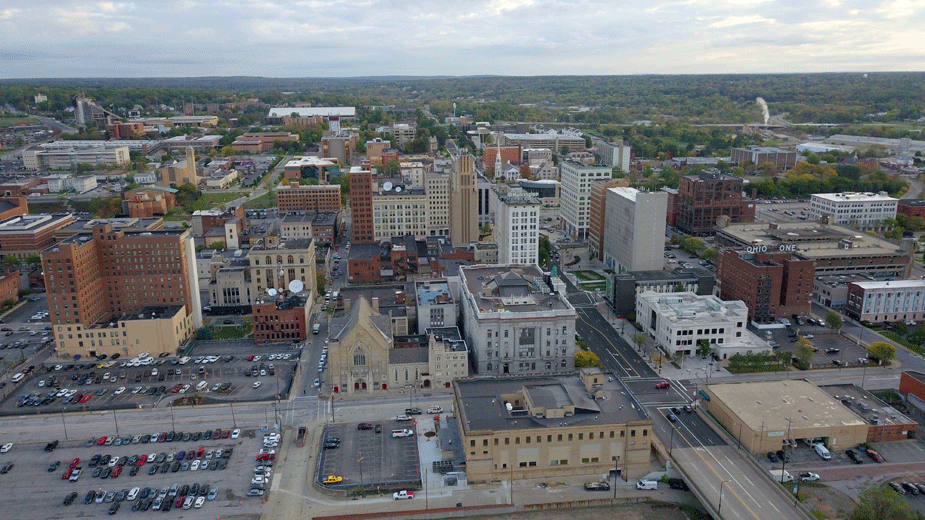Minority Health Disparities Are No Secret to Youngstown Mayor
YOUNGSTOWN, Ohio — Health inequities are no secret in the black community, but the coronavirus has cast a greater spotlight on the decades-old issue, says Youngstown Mayor Jamael Tito Brown.
A member of the Minority Health Strike Force assembled by Gov. Mike DeWine to address disparities in health care among black residents and other minority communities, Brown said he commends DeWine for recognizing and being willing to address the issue during the pandemic.
DeWine reported black residents make up 14% of Ohio’s population, but represent 26% of positive COVID-19 cases, 31% of hospitalizations and 17% of deaths.
Racial inequities also are reflected in the number of COVID-19 deaths in Youngstown as half of the 26 people who have died from the coronavirus in the city were black, but account for 42% of the city’s population of 64,955, reports the Mahoning County Public Health Department.
In Youngstown, 268 positive cases were reported. Of those cases, 33% were white residents and 36% were black residents. Twenty-six percent of positive cases were identified as unknown race.
“We’re going to need those who make the policy decisions to recognize it’s not just a short term fix, but a long-term, sustainable issue that we’re going to deal with,” Brown said. “Those making decisions from the state legislators to the federal legislators – if they really believe that this disparity needs to go away – need to make sure to put a line item in the budget to deal with it going into the future. It can’t just be one or two shots at and say, ‘OK, it’s going to work.’ It’s got to be a long-term, sustaining issue in their budget.”
DeWine said black Ohioans have a four-year shorter life span, higher rates of heart disease, hyper tension, diabetes and higher rates of poverty, adding that social conditions drive 70% of health outcomes.
“As governor, I’m deeply concerned about this and it should concern every single Ohioan. We have an obligation to act and to do something about these truly life and death issues,” DeWine said. “It is my obligation as governor to protect all our citizens. Knowing some citizens are at risk based simply upon their zip code should shock all of us.”
Mahoning County reports 1,310 positive cases of COVID-19, the disease spread by coronavirus. The cases have resulted in 287 hospitalizations and 162 deaths as of May 22.
With Youngstown excluded, 93% of the 136 deaths in Mahoning County are among white residents and 6% of those who died are black. One percent are listed as “other.”
Mahoning County has a population of 231,857, of which 80% are white and 15.2% are black.
According to Ryan Tekac, Mahoning County health commissioner, the county’s white population accounts for 66% of positive tests, while 11% of the county’s black population are positive for COVID-19. There are 4% of the cases listed as “other.”
DeWine released portions of a preliminary report from the Minority Health Strike Force that is expected to deliver final recommendations June 11.
The governor said a communication campaign is being developed to get messages about health care into communities and neighborhoods affected by poor health outcomes.
The Ohio Department of Health and Minority Health Strike Force will work with Us for Us to unveil a new communications campaign aimed at Ohio’s minority populations called, “Stay in the Fight.” This campaign will focus on the need to stay informed, stay involved, and stay inspired during the pandemic, according to DeWine.
“The governor mentioned there are grants out there for our community based organizations and faith based organizations for those who live and work and are affixed in those communities have to be the ambassadors for that message,” Brown said, adding that pastors and business owners have to have conversations about health care and make it a part of their lifestyle.
Federally Qualified Health Center, such as One Health Ohio also are part of the solution. DeWine said federal grants have enabled these clinics to be able to provide more testing for COVID-19. The governor also announced the health centers have partnered with the Nationwide Foundation to distribute thousands of community wellness kits that contain COVID-19 protection-related items, such as face coverings, hand sanitizer, and soap.
Brown said he is encouraged that One Health Ohio, which operates a health center on Wick Avenue, is looking to open a second location on the city’s South Side.
Other recommendations are for state and local health departments Ohio will significantly increase the number of public health workers who can help notify Ohioans of possible exposure to the virus. Hiring public health workers is in progress and the state’s goal is hire people who represent and reflect the make-up minority communities.
The strike team is led by Youngstown native Ursel McElroy, director of Ohio Department of Aging, and Alisha Nelson, director of RecoveryOhio.
Being a part of the Minority Health Strike force is good for the Valley, Brown said. “We make sure our needs are known and when the resources are coming our hands are up so they don’t forget Youngstown and Mahoning County.”
Brown said in order for any changes to occur locally, conversations have move out of boardrooms.
“You’ve got to meet people where they are. You can’t just say philosophically we’re going to have this conversation and then this is what they need to do,” Brown said. “The best community organizer will tell you to ask people what they need and then figure out how to get that service delivered to them.”
Copyright 2024 The Business Journal, Youngstown, Ohio.



